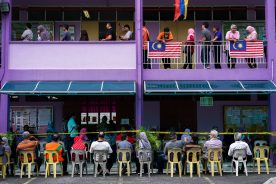[ad_1]
The promulgation of a resurrected “fake news” law by the Malaysian government in early March has drawn widespread condemnation from press freedom, civil society and human rights groups. This disquiet is magnified because the new law was not enacted by Parliament, which is currently suspended following a controversial declaration of a state of emergency in January but issued as an executive Ordinance. Critics questioned why Parliament was suspended under the emergency—and continues to be closed despite businesses and schools re-opening.
It was perhaps, unsurprising but all too predictable, that the emergency declaration would provide just the political moment for a new “fake news” law. The Anti-Fake News Act (2018) was passed by the UMNO government of former Prime Minister Najib Razak flush with the fashionable Trumpist anti press sentiment in a move critics said was designed to stifle dissent, and to strike a blow against a resurgent opposition just weeks before Najib lost the May 2018 election. The 2018 law drew stringent criticism and was finally repealed by the 2019 Pakatan Harapan government after a full agonising year of obstruction by Malaysia’s Senate.
Any hope that this suspect and discredited nomenclature would have disappeared from the language with the defeat of Trump was a naive hope that failed entirely to account for the shamelessness of the heirs to Najib.
The new ordinance contains a “definition” of fake news in two parts. The first part stipulates that “fake news” includes any news, information, data and reports, which is or are wholly or partly false relating to COVID-19.
Special note should be made of the weasel words contained in this so-called definition. A statement will qualify as “fake news” even if it is substantially true. It only has to contain something which is “partly false” for the whole statement to be impugned by the new Ordinance.
The second part of the definition, however, goes much further extending the idea of fake news to include reports about the proclamation of emergency itself (‘or the proclamation of emergency’). The use of the conjunction ‘or’ sets up a separate and distinct class of subject within the purview of the Ordinance.
…includes wholly or partly false relating to COVID-19 or the proclamation of emergency…
The predictable approach taken by authoritarians when confronted with the probable impact of such tricky legislative schemes is typically to ‘tut tut’ and suggest that such predictions are far-fetched. Not so here however.
This particular cat leaped from the bag fully formed almost immediately when a senior Minister conceded that any claim that the government sought an emergency declaration because it had lost its majority in the Parliament (Dewan Rakyat) would itself violate its fake news ordinance. Minister Takiyuddin is quoted as saying: “It is an offence”. It may now be accepted without quarrel that legitimate criticism of the government’s decision to obtain the state of emergency declaration is now a criminal offence under Malaysian law.
Thus continues a long discredited approach taken by authoritarian governments—of which sadly, Malaysia is an exemplar—to enmesh the legal system in a web of anti-press laws crafted to impair and chill dissent and free expression.
So drearily recurrent have these imprecise offences and inchoate legal standards become in the region that in Indonesia, a counterpart law became notorious for its “pasal karet” or “rubber articles”. It is reminiscent of the parody of 15th century English law, whose application was said to vary with the length of the Chancellor’s foot.
Add to this the notorious practice of selective prosecution and the chilling effect is complete.
Related

New Mandala expresses serious concern for academic freedom in Malaysia
Little wonder that American journalist William J Dobson bracketed Malaysia with Russia, China, Venezuela and Egypt as among the world’s authoritarian regimes who were keen to disguise themselves as democracies in his prescient 2015 Book the Dictators Learning Curve.
Journalists have been charged—and threatened—routinely with sedition and like offences. In 2015 internationally acclaimed cartoonist Zunar was charged with nine counts of sedition for critical tweets!
One case, among the most notorious, was the prosecution of a University of Malaya law professor for sedition for expressing his legal opinion that actions taken by the government in the Malaysian state of Perak more than six years earlier were illegal!
The current fake news ordinance adds yet another law to a raft of laws which remain on the books aimed at chilling press freedom—including the Sedition Act, the Printing Presses and Publications Act of 1984, the Communications and Multimedia Act of 1998, and the Penal Code Sections 499-502: Criminal Defamation, among others.
To add insult to injury, the ordinance also purports to operate extra-territorially, being expressed to apply to any person, whatever his nationality or citizenship, in any place outside Malaysia, who may be dealt with in respect of such offence “as if the offence was committed in any place within Malaysia”. So, the author or publisher of any commentary which dared to suggest that the Malaysian government contrived the emergency declaration because it lost its majority in the Parliament would violate its fake news ordinance.
No real surprises here, as the experience of British journalist Clare Rewcastle Brown attests. One of the key journalists responsible for breaking the 1MDB scandal, editor of the courageous Sarawak Report, Rewcastle Brown was under no illusion that she would face prosecution for her journalism in exposing the scandal if she dared to set foot in Malaysia while Najib was still the Prime Minister. How many international journalists now also can entertain real fears about visiting Malaysia in the light of legitimate analysis of this latest law.
A number of NGOs including journalists’ organisations have challenged the legality of the Ordinance. No one should hold their breath about the Malaysian Courts’ preparedness to hold Malaysian politicians to account. The recent imposition of draconian financial penalties—twice the amount called for by the government’s prosecutor—on the independent on line publication Malaysiakini offers little hope on this score.
[ad_2]
Source link